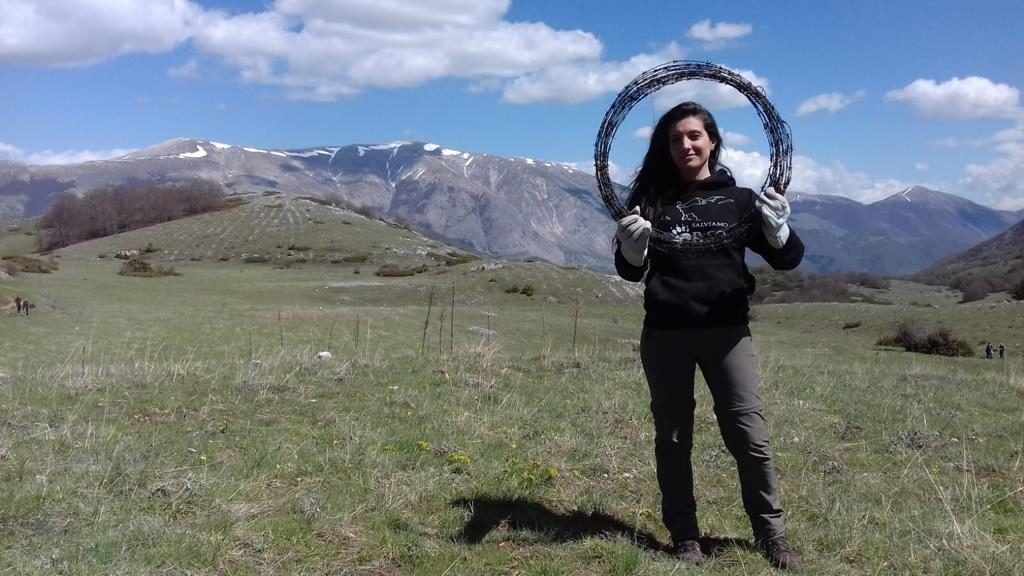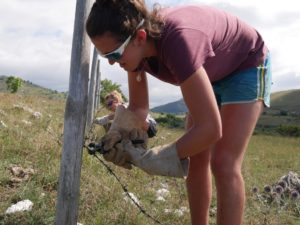Volunteers can make an invaluable contribution to rewilding efforts. The latest European Rewilding Network webinar saw members discuss the best ways to engage and support them, and the resources required to manage a volunteering programme.

Critical contribution
Volunteers can support rewilding initiatives by providing a wide range of invaluable skills, helping to raise awareness and enabling actions that might not otherwise be possible. However, accommodating their diverse backgrounds, abilities and interests is not always a straightforward proposition.
Taking place in the middle of February, this year’s first European Rewilding Network (ERN) webinar (and the network’s 24th overall) saw 18 people from 12 European countries come together to discuss the best ways of harnessing the power of volunteers to enhance rewilding. Members learned about volunteer mobilisation and various other practicalities, showcased by the efforts of hosting organisations such as Salviamo l’Orso, (Rewilding Europe’s partner in the Central Apennines), and the resources required to manage a volunteering programme.
Volunteering programmes
The webinar’s first speaker was Rewilding Europe’s LIFE Project Officer Dana Bezdíčková, who previously worked for Dutch animal welfare charity AAP, where she set up and managed a large EU youth volunteer programme.
Dana spoke about the volunteer and internship programmes and placements run by various initiatives such as the European Voluntary Service (EVS) and ERASMUS, and through direct partnerships with universities. She also described how to create and manage a volunteering programme, encompassing everything from attracting volunteers, recruitment, training, supervision, progress assessment and conflict management through to reward plans, communications and placement completion.
Under preparation
Dana also presented the ERN Bridge – a regularly updated database of international students interested in volunteering or engaging in internships on various rewilding-related topics.
This increasingly popular tool will soon be modernised, allowing Rewilding Europe to better match candidates with the needs of ERN members and other partners and familiarise European youth with the nature conservation market. “This will allow us to better handle requests from volunteers in the near future,” says Mei Elderazdi, Rewilding Europe’s ERN Coordinator.
Central Apennines focus
The next speakers were Rewilding Apennines Team Leader Mario Cipollone and Rewilding Apennines Communications Officer Angela Tavone, who spoke about their experience of recruiting and managing groups of volunteers in Italy through partner Salviamo l’Orso. Starting in 2015, Salviamo l’Orso has so far hosted more than 100 volunteers and interns.
In 2019 around 30 international volunteers were active in the Central Apennines rewilding area, where the local rewilding team is working to conserve and enhance the endangered population of Marsican brown bears. Acting as so-called “bear ambassadors“, these volunteers were responsible for a wide range of highly important tasks across the area’s five wildlife corridors. These included barbed wire removal, setting up warning reflectors and signs on roads to prevent bear-related traffic accidents, communications work, the installation of camera traps, and wildlife monitoring.
During the webinar two short video clips created by volunteer Cypriot filmmaker Constantinos Christou were screened, showcasing some of this the exciting work.
Added value

The presence of volunteers in the Central Apennines has added value to rewilding efforts in a variety of ways – some of which are not so obvious.
“The fact that young volunteers can socially revitalise depopulated villages and bridge intergenerational gaps with their energy and enthusiasm is priceless,” says Mario Cipollone. “The positive perception of bear by locals also visibly increases when volunteers are involved.”
Economic benefits
Volunteers can also generate significant economic value for hosting organisations. The Central Apennines team has calculated that hosting 21 volunteers per year, each working for five hours per day over 150 days, enhances the area’s rewilding work by 165,000 euros on an in-kind basis.
Local communities in the Central Apennines have also benefited economically from the presence of volunteers, with both the Cooperative Valleluna in the village of Pettorano sul Gizio and the municipality of Anversa degli Abruzzi regularly providing accommodation. The fact that friends and families of volunteers frequently visit the area also provides a welcome tourism boost.
Balancing act
Volunteering is not simply a one-way proposition. Mario and Angela explained to webinar participants how it has taken significant expenditure of time and money to set up and manage a volunteering programme. In the Central Apennines rewilding area, one field officer is engaged solely to manage volunteers, and to take care of related issues such as health and safety and insurance.
“You can’t simply accept requests from volunteers and then expect them to turn up and fend for themselves,” says Angela. “It is a significant challenge to provide volunteers with things such as suitable accommodation, adequate transport and an appropriate work environment.”
Some volunteers have unrealistic expectations when they arrive, so these have to be managed in the right way. And with volunteers acting as ambassadors for the host organisation, ensuring they behave in the right way, especially when interacting with local stakeholders, is also hugely important.
Volunteer appreciation
A particular highlight of the webinar was the participation of two volunteers, with Mario and Angela inviting two former volunteers – Arianna Calderamo from Italy and Paula Mayer from Germany – to attend.
Arianna’s university thesis, which involved an assessment of the rewilding programme in the Rewilding Apennines area, saw her conduct both qualitative and quantitative research during her time in the Central Apennines. Paula was engaged on a four-month professional internship in 2019, and has now concluded her bachelor thesis entitled “Analysing the future challenges of Rewilding Europe: historical, scientific and real-world perspectives”.
“Paula was one of our best volunteers in terms of commitment, willingness to help, stamina, language learning and the acquisition of new skills and competences,” says Angela Tavone. “As a mountain runner she even won three races in the Central Apennines and dedicated them to Marsican brown bear conservation.”
ERN 2.0
Today rewilding is gaining momentum as a progressive and effective approach to conservation in Europe. Underpinning this trend, the burgeoning European Rewilding Network continues to foster collaboration and amplify results.
Founded by Rewilding Europe in 2013, the aim of the ERN is to enhance the efforts of each member by facilitating the exchange of skills, insight and experience. Members meet regularly, usually via webinar, while nature-based businesses can also apply to Rewilding Europe Capital, Rewilding Europe’s enterprise loan facility.
The criteria for ERN membership have recently been revised, as the network shifts its focus from expansion to support for practical, result-oriented rewilding. Rewilding Europe extends a warm welcome to all European rewilding initiatives and encourages them to apply for ERN membership.
